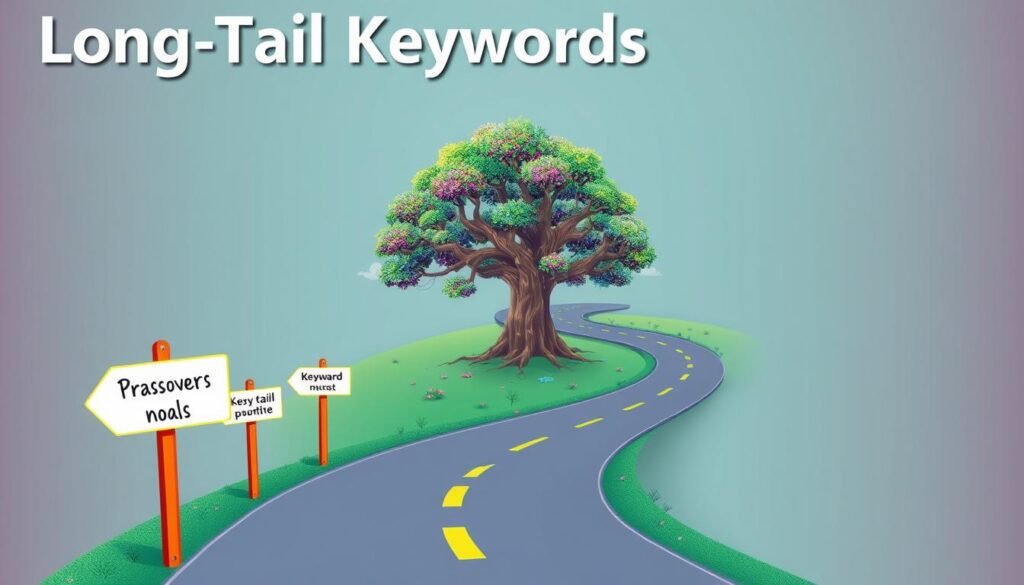Did you know that just 3-8 keywords can greatly affect your website’s visibility online1? Adding the right keywords to your content is key to good SEO. By matching your pages with what people search for, you can increase your site’s traffic and attract more customers2.
In this guide, we’ll cover the basics of keyword research, optimization, and use. You’ll learn how to improve your site’s ranking and draw in more visitors. We’ll talk about different keywords, optimizing title tags, meta descriptions, and content. You’ll get the tools to boost your website’s online presence and outdo your rivals.
Key Takeaways
- Using 3-8 keywords, including a main and secondary ones, can greatly improve your site’s visibility1.
- It’s important to put your main keyword and at least one secondary one in the first 200 words for better SEO1.
- Adding 1-2 key keywords in your meta descriptions can help more people click on your site from search results1.
- Keyword research is vital for finding what your audience searches for2.
- Optimizing your title tags, URLs, and image alt text with the right keywords can also boost your SEO2.
Understanding Keywords and SEO
Let’s dive into the basics of search engine optimization (SEO). Keywords are key here. They are the words and phrases people use to find info online. They help search engines like Google understand your website’s content3.
What Are Keywords?
Keywords can be simple words like “shoes” or “coffee.” Or they can be longer phrases, like “running shoes for flat feet” or “organic coffee beans from Ethiopia.” They’re vital for getting your site to show up higher in search results. By using the right keywords, you tell search engines what your site is about3.
Why Are Keywords Important for SEO?
Keywords are key for SEO because they affect how search engines rank your site. They help with relevance, authority, and what users are looking for4. Using keywords well can boost your site’s visibility and traffic3. It can also lead to more clicks, engagement, and sales for your business4.
Learning to research and optimize keywords is a must for SEO success. Knowing how keywords affect rankings can help you grow your online presence. It also helps you connect better with your audience34.
Keyword Research: Finding the Right Terms
Effective keyword research is key to a good SEO strategy. It starts with knowing our target audience. We need to understand their problems and search terms. By seeing things from their perspective, we find the best keywords for our site5.
Understand Your Audience
It’s important to know the language and search terms our audience uses. What problems do they face? How do they describe their needs? Knowing this helps us pick the right keywords to attract the right visitors5.
Use Keyword Research Tools
Using strong keyword research tools is also vital. Tools like Google Keyword Planner, Ahrefs, and SEMrush offer insights. They show search volume, keyword difficulty, and related keywords, helping shape our SEO plan5.
By looking at search volume, competition, and relevance, we find the best keywords. We aim for terms that are less competitive but more relevant5. This approach helps us rank better.
Tools like6 WordStream’s Free SEO Keyword Research Tool help us find the right keywords. They give us access to thousands of keywords, helping us filter and organize them effectively.

By understanding our audience and using keyword tools, we can create content that speaks to them. This improves our site’s visibility in search engines56.
Types of Keywords to Consider
Understanding different types of keywords is key to a good SEO strategy. Keywords can be short-tail or long-tail. Each type affects your website’s visibility and performance differently.
Short-Tail Keywords
Short-tail keywords are short and generic, like “shoes” or “coffee.” They have a lot of searches but lots of competition too7. These keywords are hard to rank for because of the competition8.
They are usually 1-2 words long. This makes them broad topics with lots of competition in search results8.
Long-Tail Keywords
Long-tail keywords are more specific, like “running shoes for flat feet.” They have less search volume but less competition too7. These keywords are 5-8 words long and are less competitive, making them easier to rank for8.
They are great at converting visitors into customers because they match what users are looking for better.
Using both short-tail and long-tail keywords is a good strategy. Short-tail keywords bring a lot of traffic. Long-tail keywords attract a more specific audience and can lead to more conversions.

| Keyword Type | Length | Search Volume | Competition |
|---|---|---|---|
| Short-Tail | 1-2 words | High | High |
| Mid-Tail | 3-4 words | Moderate | Moderate |
| Long-Tail | 5-8 words | Low | Low |
Knowing about different keywords helps you create a strong SEO plan. It uses the best of both short-tail and long-tail keywords to improve your website’s visibility and attract the right visitors8.
Optimizing Title Tags and Meta Descriptions
Digital marketers know how key title tags and meta descriptions are for on-page SEO. They help people find and connect with our content. This makes them vital for any online success9. By using our main and secondary keywords in these spots, we can rank better in search engines and get more clicks.
The title tag is the headline in search results, and the meta description is a quick summary of the page9. Writing good copy for these can make people want to see more of what we offer. It’s best to put the main keyword first in the title tag and keep everything short, usually under 160 characters910.
Using tools like Yoast SEO Premium helps us make better meta descriptions quickly9. But, we must be careful not to overdo it with keywords in the meta description, as it can hurt our SEO9.
Getting good at optimizing title tags and meta descriptions can really help our on-page SEO. It makes us more visible in search results and brings in more quality traffic to our site10.

“A well-crafted meta description indirectly boosts ranking on search engine results pages (SERPs) by improving user engagement and click-through rates.”10
Strategically Placing Keywords in Content
Putting your target keywords in the right spots on your website is key for SEO. Use them in your headings, like the H1 tag and H2, H3, H4 tags. This tells search engines what your page is about, helping your ranking and making it easier for users to find what they need11.
Use Keywords in Headings
Optimizing your headings with the right keywords helps search engines and users. Include your main keywords naturally, keeping your text easy to read11.
Maintain Natural Keyword Density
It’s important to use your keywords but not too much. Aim for 1-2% keyword density, or 1-2 times per 100 words. This keeps your content engaging and avoids keyword stuffing, which hurts your ranking11.
By placing keywords wisely and keeping a natural density, you improve your content for search engines. At the same time, you give your readers a great experience. This balance is essential for good SEO and more traffic1211.
“Proper keyword placement is essential for successful SEO, balancing engaging content and optimized keywords to rank well and increase lasting traffic.”
how to add seo keywords to your website
Adding SEO keywords to your website is key to improving your online presence. Start by doing thorough keyword research. This helps you understand and use keywords in the right places. You’ll see better search results and more visitors13.
Place your main keyword in the title tag, as Google shows the first 65 characters13. Use one keyword per 100-200 words to avoid stuffing13. Long-tail keywords are also good, as they’re specific and less competitive13.
Optimize your images with relevant keywords in the alt tags13. Use keywords in hyperlinks instead of “click here” to boost SEO13.
By using these tips, you can make your website more SEO-friendly. It’s all about finding the right balance between keywords and content that people enjoy14.
To optimize more, aim for at least 10 pages for every 10 topics or phrases14. Use your keywords in the main header tag (H1) at the start of your content14.
While keywords are important, don’t overdo it. Keep your approach natural and balanced14. By following these tips and keeping an eye on your strategy, you can boost your website’s visibility and performance151314.
Optimizing URLs and Image Alt Text
Improving your website’s URLs and image alt text is key for better SEO. By focusing on url optimization, seo-friendly urls, and keyword-rich urls, you make your site easier for users and search engines. Also, using keywords in alt text boosts your image seo.
URL Optimization
Your website’s URLs should be simple and clear. Avoid long, complex URLs with extra parameters. Instead, aim for seo-friendly urls that include your main keywords. This helps both search engines and users understand your page’s topic16.
Image Alt Text Optimization
Don’t forget to optimize your images’ alt text. Alt text is what shows up when an image can’t load. It also helps search engines understand your images. By adding your target keywords to the image alt text, you can boost your image seo and get your images to show up in image searches1718.
To make your image alt text better, keep it short, descriptive, and relevant. Don’t stuff it with too many keywords. Instead, aim for alt text that’s informative and helps users and search engines alike.
By optimizing your URLs and image alt text, you can make your website more visible to search engines and users. This can lead to more targeted traffic and better chances of converting visitors into customers.
Tracking and Refining Your Keyword Strategy
Creating a good seo keyword strategy is a never-ending task. You need to keep an eye on how your keywords are doing19. Look at search rankings, organic traffic, and how well they convert19. This way, you can see which keywords are bringing in the most value and adjust your strategy19.
It’s key to keep checking and updating your keyword strategy to keep your site visible19. Use tools like Google Analytics and Google Search Console to see how your keywords are doing19. Also, watching what your competitors do can help you find new ways to improve19.
When optimizing keywords, finding the right balance is important20. Aim for 2-3% keyword density to avoid penalties from search engines20. But, using keywords well can boost your rankings and bring in more qualified visitors20.
To make your keyword strategy better, use tools like Keyword.com and Seobility to find new keywords1920. Also, keep up with industry news and algorithm updates to stay ahead19.
By always tracking, analyzing, and tweaking your seo keyword strategy, your site will stay visible and relevant1920. This will help your site grow organically over time1920.
Conclusion
Adding SEO keywords to your website is key for better search engine ranking. By doing deep keyword research and using them wisely, we can draw more visitors to our site21. This makes our site more visible and attractive to the right people.
It’s important to use keywords well but also keep the site easy to use. We should always check and update our keyword plan to keep improving. Learning how to use keywords well is essential for growing our online presence and success21.
With so many blogs and websites out there, standing out is tough. Yet, Google handles over 6 billion searches every day21. Using specific, less common keywords can help us stand out and get more conversions21. By focusing on a few key words and using them smartly, we can boost our SEO and track our site’s success with tools like Google Analytics22.
FAQ
What are keywords and why are they important for SEO?
How do I conduct effective keyword research?
What are the different types of keywords to consider?
How do I optimize title tags and meta descriptions for SEO?
How do I strategically place keywords within my website’s content?
How do I optimize URLs and image alt text for SEO?
How do I track and refine my keyword strategy over time?
Source Links
- How To Use Keywords in Your Content for SEO – https://www.bkacontent.com/how-to-use-keywords-in-your-content/
- How to Use Keywords for SEO – https://optinmonster.com/using-keywords-to-improve-your-seo/
- 7 Places to Include SEO Keywords on Your Website – Pressable – https://pressable.com/blog/7-places-to-include-search-engine-optimization-seo-keywords-on-your-website/
- How Do I Add SEO Keywords to a Website? – https://www.accuranker.com/learn-seo/beginner/how-to-add-keywords-to-a-website-and-choose-the-best-ones/
- How to Do Keyword Research for SEO: A Beginner’s Guide – https://blog.hubspot.com/marketing/how-to-do-keyword-research-ht
- SEO Keywords: How to Find Keywords for Your Website | WordStream – https://www.wordstream.com/seo-keyword
- Adding keywords for SEO – https://support.squarespace.com/hc/en-us/articles/360001997648-Adding-keywords-for-SEO
- 16 Types of SEO Keywords (+How to Find & Use Them) | LocaliQ – https://localiq.com/blog/types-of-seo-keywords/
- How to create the right meta description – https://yoast.com/meta-descriptions/
- Meta Tags For SEO: A Simple Guide For Beginners – https://www.highervisibility.com/seo/learn/meta-tags/
- The Ultimate Guide to Keyword Placement for SEO – https://pureseo.com/blog/seo/keyword-placement
- Keyword Strategy in SEO: What It Is & How to Create One – https://www.semrush.com/blog/keyword-strategy/
- How Do I Add Keywords to My Content? – https://www.demandjump.com/blog/how-do-i-add-keywords-to-my-content
- How to SEO Your Content – 16 Places to Put Your Keyword Phrase – Boomcycle Digital Marketing – https://boomcycle.com/blog/how-to-seo-your-content-16-places-to-put-your-keyword-phrase/
- How to Use Keywords for SEO (And Where to Put SEO Keywords) – https://www.grademywebsite.com/help/how-to/how-to-use-keywords-for-seo/
- Image SEO Best Practices | Google Search Central | Documentation | Google for Developers – https://developers.google.com/search/docs/appearance/google-images
- How to Write Alt Text for Images for SEO (3 Easy Tips) – https://aioseo.com/how-to-write-alt-text-for-images-for-seo-3-easy-tips/
- Image Alt Text: What It Is, How to Write It, and Why It Matters to SEO – https://blog.hubspot.com/marketing/image-alt-text
- How to Adjust and Refine Keyword Tracking Efforts – https://keyword.com/guides/advanced-keyword-tracking/
- How To Add SEO Keywords to A Website | NO BS Marketplace – https://nobsmarketplace.com/blog/how-to-add-seo-keywords-to-a-website/
- How to Use Keywords in Your Content for Maximum SEO Impact – https://expresswriters.com/new-years-tip-involve-great-seo-keyword-research-content-writing/
- How to Add Seo Keywords to Your Website – https://medium.com/@hvbuiczq79/how-to-add-seo-keywords-to-your-website-cfc0da7e46a6
